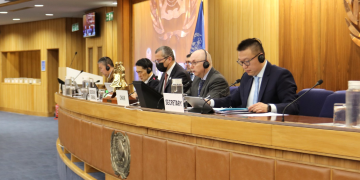UK’s Environmental Audit Committee launched an inquiry into efforts to decarbonise civil aviation and shipping, two of the UK’s hardest to abate industries.
In its report, the Committee makes several recommendations: its principal recommendation is that the Government should issue an update to the 2019 Clean Maritime Plan within three months of State Opening of the 2024 Parliament. Among the detailed recommendations made by the Committee are proposals that the Government should:
- Urgently assess the merits of introducing a voyage-based measure of the UK’s contribution to international shipping emissions
- Set stretching but achievable interim targets for UK domestic and international shipping emissions, consistent with carbon budget requirements and the overall 2050 net zero target
- Send clear and unambiguous signals to the UK maritime sector that it is committed to supporting its transition to net zero, including reviewing the funding perspectives for decarbonisation of UK shipping and further matching funding for research and development to at least 2030.
- Develop a strategy to support the manufacture of zero-emission marine fuels, accompanied by a deliver plan with clear production milestones, and consult on introducing a revenue support mechanism to incentivise commercial production of zero-emission marine fuels.
Furthermore, according to the Committee, the UK must push for more ambitious regulatory measures at the IMO and support other member states in their implementation efforts. A global greenhouse gas emissions levy is currently under active discussion at the IMO and is gaining support among its member states.
This levy could potentially replace the inclusion of shipping in the EU Emissions Trading Scheme, which was amended to cover shipping from January 2024. However, the UK has yet to extend its own Emissions Trading Scheme to include shipping, creating a risk of carbon leakage. To mitigate this risk, the UK should advocate for the early adoption of the IMO levy and implement it promptly for UK shipping, the Committee notes.
The the Committee also noted that the current method of estimating the UK’s share of international shipping emissions, based on fuel sales, may underestimate the actual emissions. A more accurate voyage-based measure should be urgently evaluated and legislated to ensure a true reflection of emissions. Additionally, the Committee highlighted that clear overall and interim targets for reducing UK shipping emissions are essential to drive sector-wide emission reductions.
Over £200 million has been allocated to research and development initiatives aimed at reducing maritime emissions from 2019 to 2025. However, sustained funding is necessary until at least 2030. The government must also support the manufacturing capacity for zero-emission fuels in the UK and consider a revenue support mechanism to encourage early-stage production, the Committee claims.
Leveraging the UK’s position in international shipping law and its role as the home of the UK Hydrographic Office could enhance shipping route optimization. Requiring vessels to meet carbon intensity standards before entering UK ports and accelerating the provision of decarbonized shore power are also crucial steps, the Committee claims.



































































